 |
 |
|
|
| |
Appointed to Professor Emeritus:
• Tannis Arbuckle-Maag, Psychology
• Patsy Lightbown, Teaching English as a Second Language
• Oswald Tee, Chemistry and Biochemistry
• Jeremiah Hayes, Electrical and Computer Engineering |
|
|
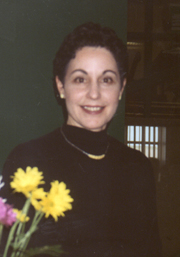 |
The following faculty members have been promoted to Professor, effective
June 1, 2002:
Vered Amit, Sociology
and Anthropology
Vered Amit holds a BA from McGill University (1977), an MA from
the University of Toronto (1980) and a PhD from Manchester University (1984).
After spending 1983 to 1986 as a lecturer and assistant professor in the
Department of Sociology at Scotland’s University of Stirling, she joined
Concordia in 1988 as an assistant professor and rose to associate professor
in 1994. She has served on numerous university and department committees.
Her research has examined youth culture, with an ethnographic study of two
groups of high school students in Montreal and the Outaouais; the impact
of multiculturalism policy, focusing on a diverse network of ethnic lobbyists
based in Montreal; and the social, political and cultural consequences of
global economic restructuring, concentrating on the development of offshore
finance and tourism industries and the growing reliance on a large foreign
labour force in the Cayman Islands.
She is currently conducting research on transnational consultancy, specifically
the social production of knowledge and expertise among consultants based
in Canada whose work involves frequent and ongoing transnational assignments.
Vered Amit has edited or co-edited six books, and is the co-author of The
Trouble with Community: Anthropological Reflections on Movement, Identity
and Collectivity, due to be released in July 2002. She has also written
nearly 40 articles, chapters for books and book reviews, and has presented
papers at more than 30 conferences. |
|
|
 |
Christian Belzil, Economics
Christian Belzil
received his PhD from Cornell in 1990, and has been a faculty member at
Concordia since 1989, when he joined the Department of Economics as an
assistant professor. He attained the rank of associate professor in 1994.
Dr. Belzil is an applied econometrician and a specialist in labour market
economics. He has done work on unemployment insurance, unemployment dynamics,
female labour supply and fertility, and the economics of education and
human capital.
Dr. Belzil has published several articles in leading economics journals
such as Econometrica, the Review of Economics and Statistics, the Journal
of Labor Economics and the Journal of Applied Econometrics.
He has held visiting appointments at the Centre for Labour Market and
Social Research at the University of Aarhus (Denmark) in 1994, the University
of Gothenburg (Sweden) in 1995 and was a Jean Monnet Fellow at the European
University Institute in Florence in 1995-1996. More recently, he received
a one-year CNRS Research Fellowship from the French government.
Dr. Belzil has also received substantial external funding for various
research projects and has supervised eight MA and PhD theses. He is currently
a fellow of the Centre for Interuniversity Research and Analysis on Organizations
(CIRANO), the Institute for the Study of Labor (IZA) in Germany and the
Director of the Labor Market Axis of CIREQ (a joint center between the
University of Montreal, McGill and Concordia).
|
|
|
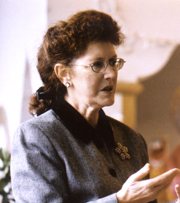 |
Pamela
Bright, Theological Studies
A native of Australia, Pamela Bright is the chair and graduate
program director of the Theological Studies Department.
After completing her undergraduate degree at Queensland, Dr. Bright received
her MA and PhD from Notre Dame. She first came to Concordia University in
1985 as a visiting professor, a position she held until she left for Loyola
University Chicago in 1987. Dr. Bright then returned to Concordia in 1992
as an associate professor.
Her primary interests include the first five centuries of Christian communities,
the spiritual legacy of the Syrian-speaking communities of the eastern Mediterranean
from the second to the fourth centuries, and the intellectual creativity
of the great Egyptians in the third and four centuries.
Dr. Bright’s principal research for many years has been how the Bible
has been understood in the Roman province of Africa (today, Tunisia, Algeria
and Morocco).
Her publications reflect these interests and focus on questions of hermeneutics
(principles of interpretation), on asceticism (principles of spiritual life)
and ecclesiology (the church as Gospel community).
Pamela Bright’s principal publications include The Book of Rules
of Tyconius: Its Purpose and Inner Logic, Early Christian Spirituality
(translation from Syriac, Greek and Latin) and De Doctrina Christiana:
A Classic of Western Culture. |
|
|
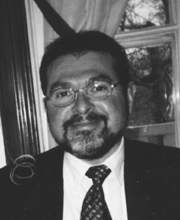 |
Maurice Charland, Communication Studies
Maurice Charland received his PhD from the University of Iowa
in 1983, specializing in rhetoric and social theory.
He joined Concordia’s Department of Communication Studies in 1981 and
quickly became active in the development of its graduate programs.
Dr. Charland was the first to teach Communication Theory at the MA level,
and was one of the principal architects of Concordia’s PhD program
in communication. He has subsequently served as director of both graduate
programs, and has supervised a number of MA and PhD students.
He is the author of two seminal essays in communication studies, “Technological
Nationalism”(1986), and “Constitutive Rhetoric: The Case of the
Peuple Québécois”(1987), the latter of which won the
2000 Charles H. Woolbert Research Award from the National Communication
Association (USA). The award retrospectively recognizes the most significant
essay in the field 10 to 15 years after its publication.
His work in rhetoric and political theory is internationally recognized
and regularly assigned in North American programs in rhetoric and communication.
Dr. Charland was the organizer in 2000 of an international conference held
at Concordia, Rhetoric- Constitution-Agency, and has presented his work
to a number of graduate programs in North America as well as to the Collège
international de philosophie in Paris.
Maurice Charland is a regular contributor to journals in rhetorical studies
and has served three terms on the editorial board of the Quarterly Journal
of Speech. He is the co-author of Law, Rhetoric, and Irony in the Formation
of Canadian Civil Culture, which will be published this fall.
|
|
|
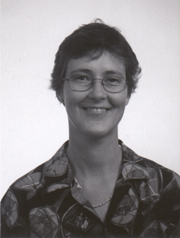 |
Claire
Cupples, Biology
Claire Cupples received a BSc at the University of Victoria, an MSc at the
University of Calgary, and a PhD at York University. She came to Concordia
as an assistant professor in January 1989, after a three-year postdoctoral
period at the University of California, Los Angeles.
Her teaching encompasses microbiology, biotechnology and molecular biology,
at both the undergraduate and graduate levels.
To date, she has supervised 12 graduate students, most of whom have gone
on to careers in the life sciences.
The goal of her research on DNA repair and mutagenesis is to understand
how cells copy their DNA accurately during cell division, and how they reverse
the damage caused by mutagens. This research has been funded by NSERC, NCIC,
CIHR and FCAR.
In the 1997-98 academic year, she was the acting chair of the Biology Department;
she has now just completed her second year of a three-year term as chair.
Dr. Cupples reviews manuscripts for journals in a wide range of disciplines
(biochemistry, genetics, microbiology), and is a member of a CIHR grant
review panel. She is currently vice-president of the Canadian Council of
University Biology Chairs.
|
|
|
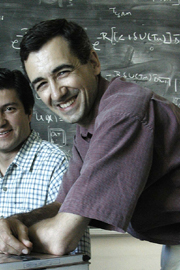 |
José Garrido, Mathematics and Statistics
An expert in risk theory, insurance statistics, credibility theory
and actuarial mathematics, José Garrido completed his doctorate in
statistics at the University of Waterloo in 1987.
He joined Concordia in 1986 as a lecturer and was promoted to assistant
professor in 1987 and associate professor in 1993. Dr. Garrido was the director
of the university’s actuarial mathematics program from 1990 until 2001.
An active member of nine professional actuarial associations, Dr. Garrido
has extensive experience as a statistical and research consultant. Through
his own initiative, he has also involved himself in a number of international
development and education projects; he has been an external advisor for
creating actuarial science programs at universities in Chile, Costa Rica,
Cuba and Spain.
He has frequently spoken abroad, having given 44 conference presentations
and invited lectures in 14 countries.
Dr. Garrido, recipient of Concordia’s Merit Award in 1990, 1998 and
2000, has supervised 22 research projects and theses and is currently supervising
the thesis work of three PhD students at Concordia.
He is the author of Robust Statistical Models and Methods for Insurance
Data Analysis, the translator of Mathématiques des Caisses
de Retraite into Spanish (Matemáticas de Fondos de Pensiones),
and has had nearly 20 articles published in 10 international journals.
|
|
|
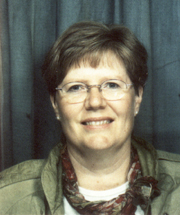 |
Danielle Gauvreau, Sociology and Anthropology
A graduate of the Université de Montréal, Danielle
Gauvreau holds a BA in mathematics (1976), and MA (1979) and PhD (1986)
degrees in demography.
She joined Concordia University in 1991 as assistant professor and was promoted
to associate professor in 1994. Dr. Gauvreau is currently the Department
of Sociology and Anthropology’s graduate program director and Concordia’s
representative at the Quebec Interuniversity Centre for Social Statistics
(Regional Data Center).
Before coming to Concordia, she was professeure-chercheure at the University
of Quebec at Chicoutimi and a researcher at the University of Quebec.
Her expertise is in historical demography and social demography, applied
to Quebec and Canadian populations. Dr. Gauvreau’s research and teaching
interests include fertility and contraception, historical and contemporary
trends in fertility, marriage, mortality and migration processes, quantitative
and qualitative analysis of demographic trends, contemporary trends in developed
countries, gendered demography, and demographic transitions.
Danielle Gauvreau has contributed articles to over 40 books and journals
and has spoken at more than 60 conferences and seminars in Brazil, Canada,
France, the Netherlands and the United States. She is the author of Québec:
Une ville et sa population au temps de la Nouvelle-France and co-author
of La situation démolinguistique du Québec. She was
the editor of the journal Cahiers québécois de démographie
for six years and has co-edited three other books.
|
|
|
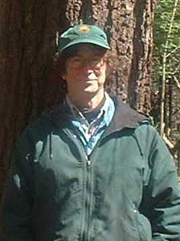 |
David Greene, Geography
David Greene arrived at Concordia University in 1988 as a lecturer,
and was promoted to assistant professor in 1990 and associate professor
in 1995.
After graduating with a BSc from the University of California at Berkeley,
he received an MSc (specializing in biogeography) and a PhD (specializing
in plant ecology) from the University of Calgary.
Professor Greene sits on the department’s ethics, graduate curriculum,
and Concordia NSERC scholarship committees, and is the chair of the undergraduate
curriculum and departmental personnel committees.
Dr. Greene’s primary interest is in the role of disturbances (fire,
flood, wind-throw, ice storms) on plant communities, forest regeneration,
and plant immigration. He has written many refereed publications and edited
a collection of papers by four biogeographers for the “Focus”
section of Canadian Geographer in 1988.
Besides appearing at various industry workshops, David Greene has presented
at over 30 conferences and academic workshops in Canada, England, Finland,
Italy and the United States. In 2000, he organized a symposium on recruitment
modeling at the Fourth International Workshop on Disturbance and the Boreal
Forest, held in Kuhmo, Finland.
He is a member of the Montreal-based Groupe de recherche en écologie
forestière interuniversitaire (GREFi) and of the NSERC-funded Centres
of Excellence in Sustainable Forestry.
|
|
|
 |
Marcus Lawrence, Chemistry and Biochemistry
Marcus Lawrence has been chair of the Department of Chemistry and Biochemistry
since 2000. Before his appointment as department chair, he served as director
of the Chemistry/Biochemistry Cooperative Education Program.
Dr. Lawrence joined the university as an assistant professor in 1986 and
became associate professor in 1992. He has also been an adjunct professor
in the Department of Physics since 1988.
He holds BSc and MSc degrees from the Université du Québec
à Trois-Rivières, and a PhD from the Institut national de
la recherche scientifique - Énergie. His main area of research involves
the study of transducer materials and transducer structures applied to the
development of photovoltaic energy conversion devices and chemical sensors.
Dr. Lawrence, who is co-inventor on four patents, has attracted significant
research funding and contracts during his career at Concordia and has had
over 40 articles published. He has also given close to 50 conference and
invited presentations.
Lawrence is a member of the department’s Co-op Advisory Committee and
chair of the Search Committee for Tenure-Track Appointments. He also serves
on the university’s Arts and Science Faculty Council and Committee
for Appointments of Distinguished Professors Emeriti.
|
|
|
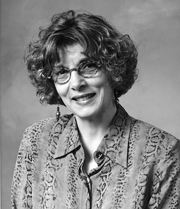 |
Lucie Lequin, Études françaises
À la barre du Département d’études françaises
depuis 1996, la professeure Lucie Lequin compte plus de 20 années
d’enseignement à l’Université Concordia.
Son engagement dans le milieu universitaire est vaste. Elle est présidente
de CUFA/APUC (Association des professeurs de l’Université Concordia)
et y travaille activement depuis 1995. Elle a siégé à
de nombreux conseils.
De nombreuses publications parues au Canada, en Europe, aux États-Unis,
en Argentine et au Brésil portent sa signature, qu’il s’agisse
d’ouvrages critiques, d’actes de colloques ou d’articles
spécialisés dont certains ont été traduits en
anglais, en portugais et en espagnol ou repris dans des recueils de critiques
littéraires.
Parce qu’elle a ouvert un nouveau champ de recherche, l’écriture
des femmes migrantes au Québec, Lucie Lequin a été
invitée comme conférencière dans différentes
universités en Espagne et en Italie ou dans des colloques internationaux
au Japon et en Europe.
Ses recherches sont subventionnées par le CRSH ; son projet actuel
s’intitule : Écriture des femmes migrantes et problématisation
du soi et du monde.
Elle est membre du comité de rédaction de la revue Journal
of Canadian Studies / Revue d’études canadiennes et de la
revue littéraire multilingue électronique Variations. Elle
est coordonnatrice du comité scientifique de l’Association internationale
des études québécoises. Elle est membre du comité
régional de Canadian Woman Studies / Les cahiers de la femme.
Elle a participé à des jurys littéraires importants,
notamment le Grand Prix littéraire de la Ville de Montréal
et le Prix du Ministre.
Ayant à son actif une quinzaine de cours sur la littérature,
les femmes et la culture québécoise, elle a de plus dirigé
et co-dirigé des thèses d’étudiantes et étudiants
des cycles supérieurs.
|
|
|
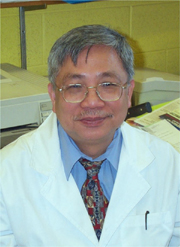 |
Raymond Le Van Mao, Chemistry and Biochemistry
Raymond Le Van Mao obtained his PhD in 1974 from the University
of Lyon I, and became an associate professor at Concordia in 1991.
He works in the field of physical organic chemistry and industrial chemistry.
His current research interests lie in the areas of inorganic materials,
heterogeneous catalysis, petroleum and natural gas chemistry, gases and
vapors separation.
|
|
|
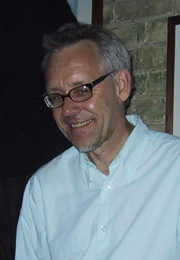 |
Greg Nielsen, Sociology and Anthropology
Greg Nielsen completed his undergraduate studies at the University
of Regina, and received an MA from Concordia University and a PhD from the
Université de Montréal.
He joined Concordia in 1995 as an associate professor in the Department
of Sociology and Anthropology after serving for seven years as an assistant
professor and associate professor at York University. He is also currently
an adjunct professor for York University’s Graduate Programs in Sociology
and Social and Political Thought.
Dr. Nielsen, who is director of the Concordia Centre for Broadcasting Studies,
has focused his research on social theory and interdisciplinary studies,
the sociology of culture, politics, and the media.
During his career at Concordia and York, Greg Nielsen has generated individual
research grants totalling more than $1 million. While at Concordia, he has
been involved in large-scale consortium projects that now include over $4
million in funding.
His expertise has been called upon numerous times in television and radio
interviews, and he has delivered presentations and guest lectures in Canada,
the United States, Germany, Finland, France, Mexico and England. He was
a guest professor at the John F. Kennedy Institute for North American Studies
in Berlin, the University of British Columbia and UQAM.
He is the author of The Norms of Answerability: Social Theory Between
Bakhtin and Habermas and Le Canada de Radio-Canada: Sociologie critique
et dialogisme culturel.
|
|
|
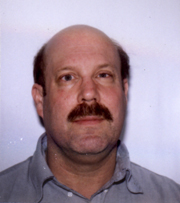 |
Michael Oppenheim, Religion
Michael Oppenheim joined Concordia in 1974 as an assistant professor, and
obtained his PhD in 1976 from the University of California, Santa Barbara.
He became an associate professor in 1980.
Dr. Oppenheim was chair of the Department of Religion in 1983, from 1985
to 1991, and from 1997 to 1999. He was a member of the Faculty Council from
1983-89, in 1990, and from 1997-99, and has chaired the gender equity committee
of the School of Graduate Studies since 1992.
He is a member of the American Academy of Religion, the Association for
Jewish Studies, the Canadian Society for the Study of Religion and the American
Philosophical Association.
His books include What Does Revelation Mean for the Modern Jew? (Edwin
Mellen Press, Lewiston, N.Y., 1985), Mutual Upholding: Fashioning Jewish
Philosophy Through Letters (Peter Lang, N.Y., 1992) and Speaking/Writing
of God: Jewish Philosophical Reflections on the Life with Others (State
University of New York Press, Albany, 1997). He has also authored close
to two dozen articles in the areas of modern Jewish philosophy, philosophy
of religion, modern Judaism, Israel, and Jewish identity.
|
|
|
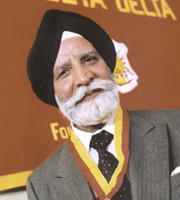 |
Balbir Sahni, Economics
Balbir S. Sahni obtained his PhD from the New School for Social
Research, New York, and an MBA from New York University.
He is director of the co-op programs in economics, and director of the Centre
for International Academic Cooperation (CIAC).
In addition to his various scholarly contributions, in the latter capacity,
he has contributed significantly to Concordia’s increased international
visibility and enrolment.
Dr. Sahni has received many awards, including the 2001 Life Outstanding
Achievement Award from the Indo-Canadian Chamber of Commerce, the 1999 Outstanding
Indo-Canadian Award from the National Indo-Canadian Council (NICC), and
the 1995 Award of Merit for contributions to Canadian Studies in India.
He was appointed by Canada’s Secretary of State for External Affairs
to Canada’s National Committee on Pacific Economic Cooperation (CNCPEC)
in 1988.
He is a member of the Board of Directors of the Canadian Bureau for International
Education (CBIE), and a former member of CNCPEC, the Program Steering Committee
of Canadian International Development Agency (CIDA) – The Conference
Board of Canada (CBoC) projects, president of the Shastri Indo-Canadian
Institute (SICI).
Dr. Sahni was chair of the Economics Department from 1977 to 1986. He has
published extensively on public economics, covering both analytical and
empirical topics relating to economies of Canada, India, Quebec, the OECD
and the U.S.
|
|
|
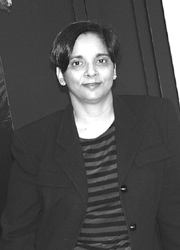 |
Reeta Tremblay, Political Science
Reeta Tremblay received her doctorate in political science from the University
of Chicago. She joined Concordia’s Political Science Department in
1989 and, after serving two terms as graduate program director, became the
department’s chair in 1998.
Her research has dealt with identity-based politics (including the secessionist
movement in Kashmir, Indian federalism and the multicultural project), public
policy (which includes growth and equity policies, women and self-government,
peace and conflict resolution), and popular culture (Indian popular cinema).
Dr. Tremblay is North America’s leading authority on the secessionist
movement of Kashmir and Indian federalism. Canadian policy makers have frequently
called upon her expertise when formulating policy for South Asian, and her
work, particularly on Kashmir, has been widely cited and used in class curricula.
Since receiving her doctorate, she has produced 30 articles and chapters
in books, written one book, and edited three books and one annotated bibliography.
In addition, she has presented more than 50 papers at academic and professional
conferences. She has been a recipient of SSHRC funding since 1994 and has
also received funding from the Canadian International Development Agency
and the Canadian Council of Area Studies and Learned Studies.
During her career at Concordia, she has taught at both the undergraduate
and graduate levels. Her teaching includes specialized seminars and lectures
on Asia and South Asia, Democracy and Development, Ethnicity and Comparative
Public Policy and Public Administration.
|
|
|
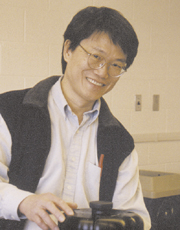 |
Adrian Tsang, Biology
Adrian Tsang received his BSc degree from the University of Alberta
with first class honours in genetics. He was awarded an NSERC postgraduate
scholarship to pursue his PhD in cell biology and biochemistry at York University.
He began his postdoctoral studies in developmental biology on a NATO science
fellowship at the Imperial Cancer Research Fund in London, England. After
his postdoctoral work, he received an NSERC university fellowship to continue
work on developmental biology as an assistant professor at York University
and McGill University.
Dr. Tsang joined Concordia University as an associate professor in 1991.
During his sabbatical leaves, he has conducted research at the Worcester
Foundation for Medical Research in Massachusetts and DSM/Gist-brocades in
Delft, the Netherlands. His research interests include biotechnology, genomics
and understanding how organisms developed from single cells.
Dr. Tsang is a founding member and director of the Centre for Structural
and Functional Genomics. He has served as a member of the scientific committee
of Genome Quebec and a member of the genome study section of the National
Institutes of Health in the U.S. Dr. Tsang currently receives $9 million
for his research projects from Genome Canada, Genome Quebec, and NSERC.
He is also a project leader of a $3.15 million CFI grant.
|
|
|
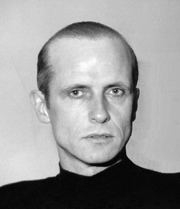 |
John Zacharias, Geography
John P. Zacharias received his undergraduate education at the University
of Saskatchewan, his MA at the School of Community and Regional Planning,
University of British Columbia, and his PhD from the Faculté de l’aménagement,
Université de Montréal.
He joined Concordia as a lecturer in 1990 in the urban studies program,
and has been program director since 1992. He became an associate professor
in 1995.
From 1974 to 1982, he worked as project planner for the City of Vancouver’s
False Creek development team, chief planner and implementation coordinator
for the Fairview area redevelopment project (Vancouver), and consulting
planner for the province of British Columbia.
He also worked as an independent consultant on urban development projects
in Quebec and B.C., and was a member of the working committee, Commission
régionale de développement de l’île de Montréal
in 2001. His research on pedestrianization has led to international collaborations
in Rotterdam, Osaka, Paris, San Francisco, Tianjin and Shanghai.
He has received about $404,000 in grants, notably from SSHRC, FRDP and CMHC,
and developed a number of courses on urban systems, behaviour and the environment,
urban ecology and environmental impact, and other subjects. He has published
numerous refereed articles and research reports.
|
|
|
|
|
Vladimir Zeman Philosophy
Vladimir Zeman’s long association with Concordia began in 1968 when
he came to Sir George Williams University as a visiting professor. He became
assistant professor in 1969 and associate professor in 1971.
Before coming to Sir George Williams, Dr. Zeman was an assistant professor
in his native Czechoslovakia at Charles University, where he earned his
PhD in philosophy and methodology of science.
Dr. Zeman has served as department chair (1971-1974), assistant dean (1979-1983),
acting department chair (1999-2000), and has been the co-director of the
University Centre for System Theory and Knowledge Engineering since 1992.
He has served on numerous department and university committees throughout
his career and is currently a member of the Faculty Tenure Committee.
Among the courses Dr. Zeman has taught at Concordia are Critical Thinking,
Methods of Inquiry, Introduction to Epistemology, Philosophical Problems
of Artificial Intelligence, Contemporary Philosophy, Introduction to Logic
and Philosophy of Science, and Nineteenth Century Philosophy. He has also
taught courses examining the theories of Habermas, Kant and Marx, and has
supervised 24 MA and PhD theses.
Vladimir Zeman has lectured abroad in the Czech Republic, Germany and Switzerland
and has been invited to appear as a guest lecturer this month at the University
of J.E. Purkyne, Czech Republic.
He is a member of the Canadian Philosophy Association, Kant Society of North
America, Leibniz Society, International Institute for System Theory and
Cybernetics, and North American Fichte Society.
|
|
|



